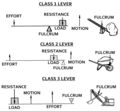Lever
Lever
A lever is a simple machine consisting of a beam or rigid rod pivoted at a fixed hinge, or fulcrum. It is one of the six simple machines identified by Renaissance scientists drawing from Greek texts on technology.
Principle of levers
The principle of levers, also known as the law of the lever, states that the distance from the fulcrum to the point of effort is inversely proportional to the distance from the fulcrum to the point of resistance. This principle is used to determine the mechanical advantage of the lever.
Types of levers
There are three classes of levers, depending on the relative positions of the fulcrum, the load and the effort.
First-class levers
In a first-class lever, the fulcrum is located between the effort and the load. Examples of first-class levers include seesaws, crowbars, and pliers.
Second-class levers
In a second-class lever, the load is located between the effort and the fulcrum. Examples of second-class levers include wheelbarrows, nutcrackers, and bottle openers.
Third-class levers
In a third-class lever, the effort is located between the load and the fulcrum. Examples of third-class levers include tweezers, brooms, and the human arm.
Applications of levers
Levers are used in a wide variety of applications, from simple tools to complex machinery. They are used to amplify an input force, change the direction of a force, or increase the speed or distance of a force.
See also
Transform your life with W8MD's budget GLP-1 injections from $125.
W8MD offers a medical weight loss program to lose weight in Philadelphia. Our physician-supervised medical weight loss provides:
- Most insurances accepted or discounted self-pay rates. We will obtain insurance prior authorizations if needed.
- Generic GLP1 weight loss injections from $125 for the starting dose.
- Also offer prescription weight loss medications including Phentermine, Qsymia, Diethylpropion, Contrave etc.
NYC weight loss doctor appointments
Start your NYC weight loss journey today at our NYC medical weight loss and Philadelphia medical weight loss clinics.
- Call 718-946-5500 to lose weight in NYC or for medical weight loss in Philadelphia 215-676-2334.
- Tags:NYC medical weight loss, Philadelphia lose weight Zepbound NYC, Budget GLP1 weight loss injections, Wegovy Philadelphia, Wegovy NYC, Philadelphia medical weight loss, Brookly weight loss and Wegovy NYC
|
WikiMD's Wellness Encyclopedia |
| Let Food Be Thy Medicine Medicine Thy Food - Hippocrates |
Medical Disclaimer: WikiMD is not a substitute for professional medical advice. The information on WikiMD is provided as an information resource only, may be incorrect, outdated or misleading, and is not to be used or relied on for any diagnostic or treatment purposes. Please consult your health care provider before making any healthcare decisions or for guidance about a specific medical condition. WikiMD expressly disclaims responsibility, and shall have no liability, for any damages, loss, injury, or liability whatsoever suffered as a result of your reliance on the information contained in this site. By visiting this site you agree to the foregoing terms and conditions, which may from time to time be changed or supplemented by WikiMD. If you do not agree to the foregoing terms and conditions, you should not enter or use this site. See full disclaimer.
Credits:Most images are courtesy of Wikimedia commons, and templates, categories Wikipedia, licensed under CC BY SA or similar.
Contributors: Prab R. Tumpati, MD





